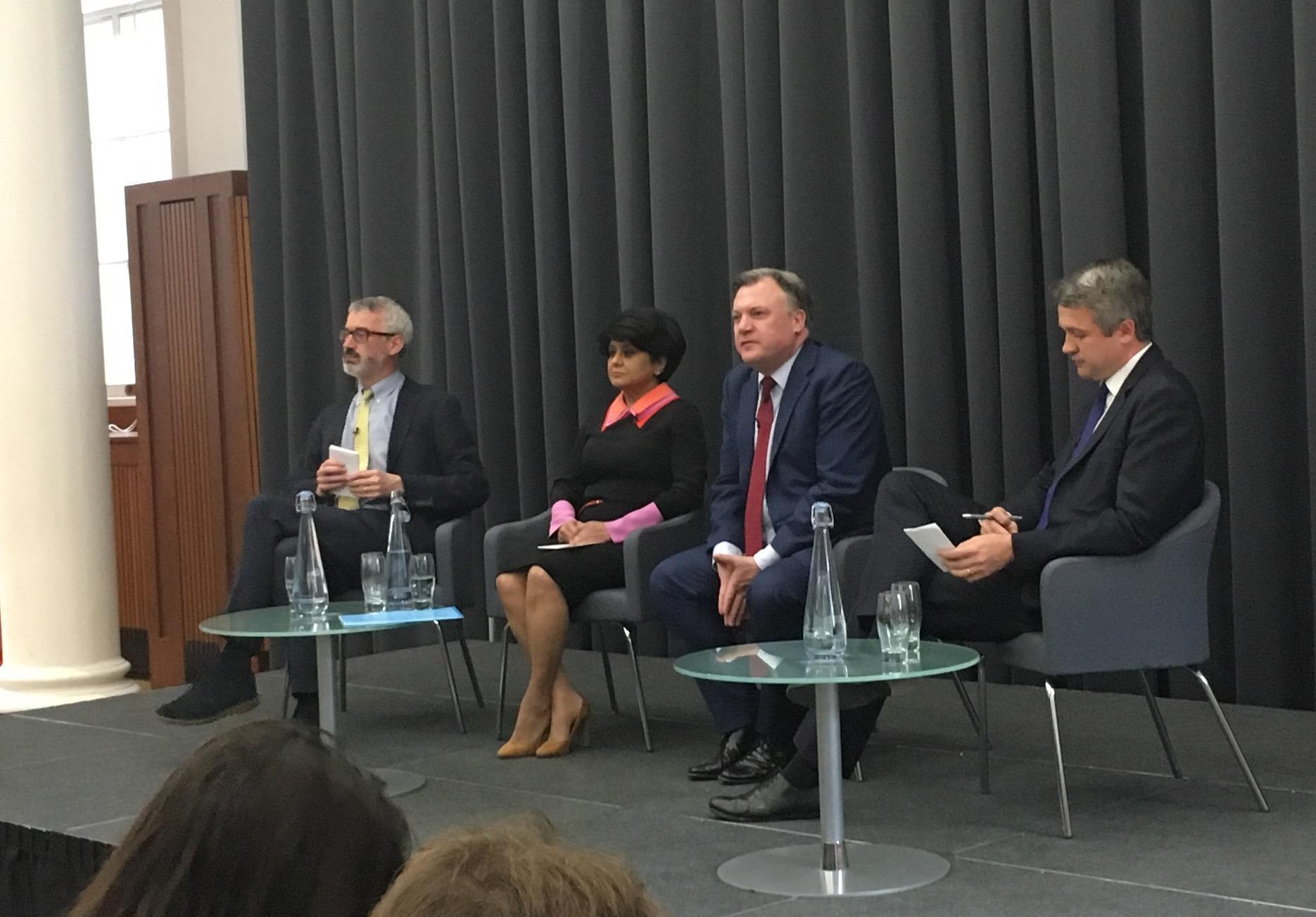The alternative history according to Ed Balls, in which Britain left the EU in 2012
At a seminar to mark the 20th anniversary of the Bank of England’s independence, the former shadow Chancellor said it saved us from an early Brexit


I went to King’s College London yesterday for a Strand Group seminar on Bank of England independence – the 20th anniversary of which is on Saturday. The consensus was that it was a good idea that has stood the test of time, and that, if there were problems with the design of bank regulation which accompanied it, they have now been put right. Although this last conclusion was qualified by some uneasy speculation that the next economic crisis will be different from the last.
As ever, my colleague Jon Davis, director of the Strand Group, had assembled a remarkable cast of speakers. Mark Carney, the Governor of the Bank, even attended the reception afterwards, along with Jon Cunliffe, one of his deputies, although they didn’t say anything on the record because there is an election campaign on.
Ed Balls, the main architect of Bank of England independence as adviser to Gordon Brown, defended Tony Blair and Brown’s decision to announce it before the new Cabinet could meet. “It was not a collective decision, but there was not a single cabinet minister who would have batted an eyelid.” He was backed by Terry Burns, who was permanent secretary of the Treasury at the time, and who pointed out that interest rate decisions – which had until then been taken by the Chancellor and Prime Minister – “didn’t go to Cabinet”, nor did the decision to leave the European exchange rate mechanism.
Lord Burns did not appear to be an enthusiast for the policy, however. He was asked what would have happened if the decision to grant the Bank operational independence over interest rates had never been taken, and said that, against a “benign world economic background”, things would have been “messier, but the outcome would probably not have been very different”.

Balls disagreed vehemently. “It is always, always the case that in the three years before a disaster everybody agrees on the policy.” That was what happened with restoring the Gold Standard in 1925 and with joining the ERM in 1990, he said. If the Bank hadn’t been granted independence, he thought there would have been instability and political tension. “Someone would have been sacked. The CBI and the TUC would have united to demand that we join the euro. When the financial crisis came we would have crashed out of the euro; it would have been like Greece on steroids.” He concluded that Britain would have left the EU – without a referendum – “five years ago”.
I’m not sure that alternative history is quite right, because Labour had promised a referendum on joining the single currency, and I don’t think it would have won it. But everyone at the seminar, with the exception of William Keegan, one of my fellow visiting professors at King’s, seemed to agree it was sensible to take interest rate decisions away from politicians.
Kate Barker, the economist who was a member of the independent Monetary Policy Committee from 2001 to 2010, gave an insight into its workings. She said that every new member of the committee would ask, at their first meeting, why interest rates were at the level they were, but that after that the argument would always be for or against small movements up or down from whatever the rate was.
She said that members of the committee were asked to produce what were known as “Nightmares”, outlining scenarios for what could go wrong in the economy, but that before the crisis of 2007-08 “there was a failure to realise what the risks were”.
The panellists discussed the Bank’s role in overseeing the City, a sober and technical debate in contrast to past heated political exchanges over Labour supposedly causing the crash by lax regulation. Balls agreed with Rupert Harrison, former adviser to George Osborne, that it had been right to return banking supervision to the Bank of England, but they tussled politely over Balls’s view that the Governor of the Bank had too much power.
Shriti Vadera, a minister under Gordon Brown and now chair of Santander UK (“I would never accuse the City of short-termism after being in politics”), sees bank regulation from the other side. She said that she was concerned about the effect of Brexit on international capital markets and commented that regulatory cooperation between the two sides was likely to need a degree of joint supervision from both UK and EU authorities.
She disagreed with Nick Macpherson, the former permanent secretary of the Treasury, who said: “You don’t have crises unless people don’t see them coming.” The face of Tom Scholar, the current permanent secretary, also on the platform, gave nothing away.
The session concluded on Macpherson’s optimistic note. Harrison said the fuss over Theresa May’s conference speech, in which she said “a change has got to come” to the monetary policy of “super-low interest rates and quantitative easing” and which was seen as an infringement of the Bank of England’s independence, shows the strength of the institution. Macpherson added: “One reason the British government can borrow very cheaply over long periods is because our institutions are very strong – we’re not bad at these things.”
Update 4 May: The Financial Times has an excellent report of the event here.
Join our commenting forum
Join thought-provoking conversations, follow other Independent readers and see their replies
0Comments